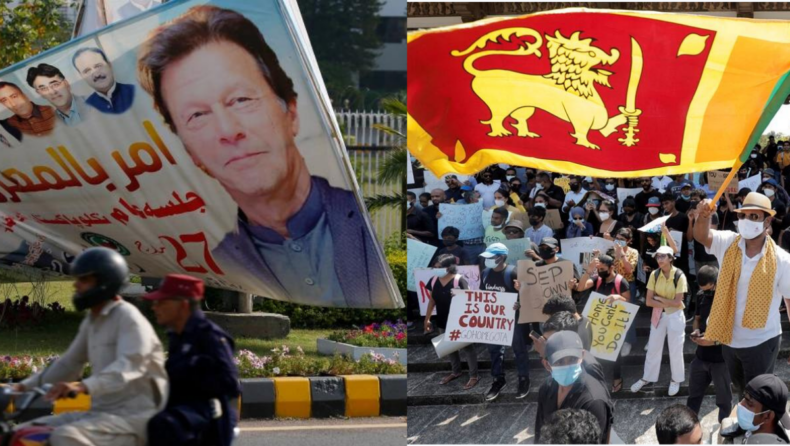The events in the neighborhood of India were discussed at a meeting between Prime Minister Narendra Modi and External Affairs Minister S Jaishankar along with MEA officials held at parliament and was not officially announced, said reports.
According to people in touch with developments of recent turmoil, India is keeping a close eye on the political and economic turbulence affecting two of its neighbors, Pakistan and Sri Lanka, though both countries are facing internal issues that have no direct effect on New Delhi.
What is the current situation and Way Forward for India
The Supreme Court adjourned on Monday without ruling on the legitimacy of Pakistan Prime Minister Imran Khan’s surprising move to dissolve Parliament and announce early elections in order to avoid a no-confidence motion that was very difficult for government to survive.
When the case returns to court on Tuesday, a five-judge panel led by Chief Justice Umar Ata Bandial will hear multiple petitions from the government and opposition.
Khan has recommended former Chief Justice Gulzar Ahmad for the job of interim Prime Minister to oversee the polls, according to outgoing Information Minister Fawad Chaudhry.
The opposition in Sri Lanka rebuffed President Gotabaya Rajapaksa’s offer to join a unity government as “nonsense” on Monday, instead demanding his resignation for mounting food, fuel, and medicine shortages.
All members of the government save the president and his elder brother, Prime Minister Mahinda Rajapaksa, resigned on Sunday after many days of public protests and all cabinet members leaving their offices except the president and Prime Minister Mahinda Rajapaksa.
According to sources acquainted with the situation, India opted not to take an official stance on Pakistan’s constitutional crisis because it was a domestic issue.
According to sources, India has already provided $2.4 billion in financial assistance to Sri Lanka in recent weeks, including loan repayment deferrals and $1.5 billion in lines of credit for emergency purchases of oil, food, and medicines.
“Everything depends on the Sri Lankan government, if the country requires more help we’ll see if we can do something,” stated a government official.
Pakistan has been thrown into a constitutional crisis after the National Assembly’s deputy speaker refused to allow a debate on a no-confidence motion against Khan filed by the combined opposition on the grounds that it was part of a “foreign conspiracy.” Khan’s desire to dissolve Parliament and call elections within 90 days was granted by President Arif Alvi.
The Prime Minister cannot dissolve the National Assembly while facing a no-confidence vote, according to the Constitution. Nearly 200 legislators backed the combined opposition, including more than two dozen dissidents from Khan’s party — more than the 172 votes needed to pass the no-trust motion in the 342-member House.
Khan has accused the opposition of working with the US to bring about “regime change,” using a diplomatic cable written by Pakistan’s former ambassador to Washington after a meeting with a top US official. The charges have been dismissed by the US administration.
President Alvi asked Imran Khan and opposition leader Shehbaz Sharif to decide on an interim prime minister on Monday, but Sharif refused. “How can we reply to a person who has made joke of constitution?” Sharif asked at a press conference.
Khan also declared that on Monday night, he will lead a protest march in Islamabad against “turncoats” who are part of an “international conspiracy” against his government.
President Rajapaksa made an outreach to the opposition in Colombo, as armed troops were dispatched to quash further protests over Sri Lanka’s worst economic crisis since independence in 1948. Thousands of demonstrators attempted to attack the Prime Minister’s – and the Rajapaksa clan’s – private house in the country’s south.
Police used water cannon and tear gas to scatter the protestors.
The president invited opposition parties to “join the endeavor to find answers to the national issue” after nearly all cabinet officials quit on Sunday. Rajapaksa’s immediate resignation was demanded by the communist People’s Liberation Front (JVP).
The major Tamil opposition organisation, the Tamil National Alliance (TNA), has also ruled out joining a Rajapaksa-led ministry.
“To assume that opposition MPs will back up a government that is crumbling,” JVP politician Anura Dissanayake told reporters in Colombo. On Monday, central bank governor Ajith Cabraal, who has long opposed Sri Lanka’s request for an IMF bailout, resigned, allowing the Rajapaksa’s to consolidate their control and suppress public dissent.
Four departing ministers were reappointed, three to their previous posts, and brother Basil Rajapaksa was replaced as finance minister by a former justice minister.
According to political columnist Victor Ivan, a cabinet reshuffle disguised as a national government would not be acceptable to the public. “Not only is a big reform programme required to reinvigorate the economy, but it is also necessary to address governance issues,” Ivan told AFP.
Published By: Manan Khurana
Edited by: Subbuthai Padma













